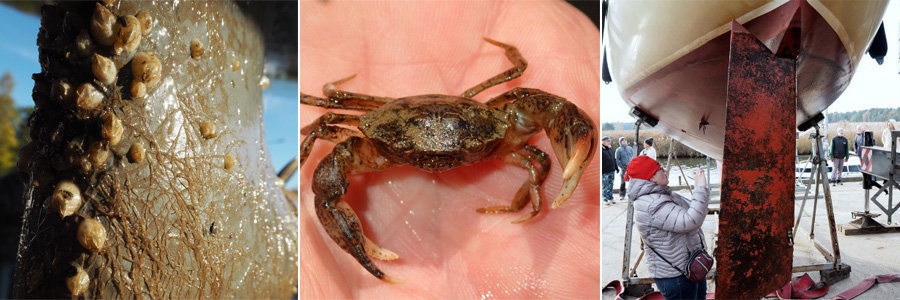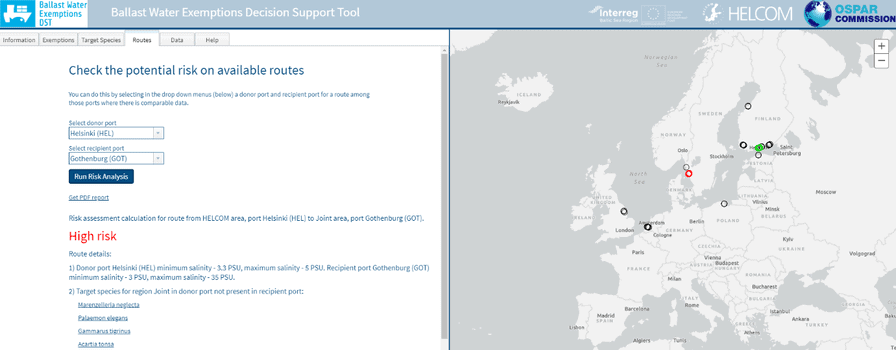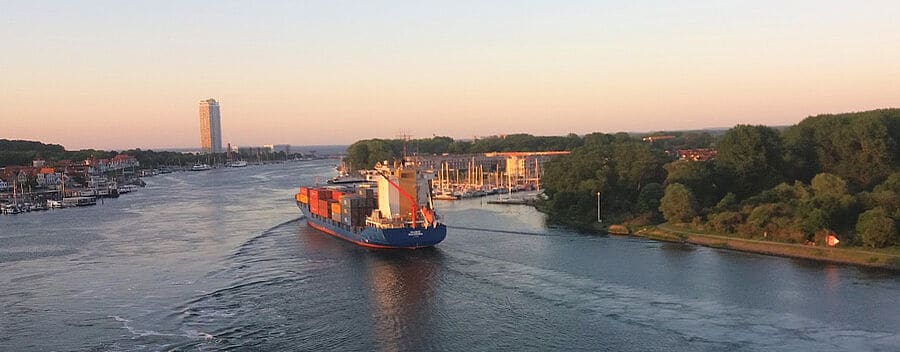At any moment in the Baltic marine area, about 2,000 ships are transporting people, goods, but also stowaways: marine organisms from distant places, like Harris mud crabs, that colonise the Baltic Sea waters. The Interreg project COMPLETE brought together people with smart ideas how to translate the existing regulations into a working system to prevent alien species from invading the Baltic Sea.

1) Barnacles and other biofouling can attach to the underwater parts of a boat ©Keep the Archipelago Tidy Association
2) Harris mud crab (Rhithropanopeus harrisii) is one of the non-indigenous species found in the Baltic Sea ©Sergej Olenin
3) Taking biofouling samples from a boat rudder ©R. Brzana
Aliens in the Baltic Sea waters
Alien species in the marine environment do not recognise national borders. The world shipping fleet today creates a fast-moving and still increasing highway for these organisms, as they can attach to ship hulls, hide in niches, and live in the ballast water tanks of ships. Once transported to a new area, these aquatic organisms may simply colonise it, making their eradication practically impossible. The only way to stop the invasion of alien species is to prevent their introduction in the first place.
Alien species pose a substantial threat to the aquatic biodiversity and lead to the decline of native populations, negatively affecting the ecosystem. The United Nations International Maritime Organization (IMO) introduced the Ballast Water Management Convention (2017) as well as the Guidelines for Biofouling Management of Ships (2011) and Recreational Craft (2012) to help prevent alien species from spreading in the world.
How to put political agreements into practical actions?
All countries in the Interreg Baltic Sea Region Programme area have ratified the IMO Convention on ballast water. Still there are challenges to master. How to implement the convention in a harmonised way in the Baltic Sea region? How to manage exemptions in routes where risk of spreading marine organisms is low? How to implement the IMO Guidelines and Guidance for Biofouling Management in the region although they are not legally binding instruments? These complex challenges require a comprehensive regional approach.
COMPLETE looks for solutions
In the Interreg project COMPLETE, scientists from seven Baltic Sea region countries cooperated with competent environmental and maritime authorities to find solutions for managing the risks of alien species transported by shipping. Shipowners, port authorities, companies providing hull cleaning services, boating associations and others had cooperated already before the COMPLETE project. This helped to identify knowledge gaps based on the needs of all involved.
Among the concrete solutions that the COMPLETE project has developed are: tools for harmonised implementation of the IMO Convention, a proposal for a regional biofouling management roadmap, and a proposal of a monitoring programme of non-indigenous species for the Baltic Sea.
Atte Lindqvist, project manager at one of the partner organisations, Keep the Archipelago Tidy Association in Finland: “The Baltic Sea is important to us, our members and target groups, and therefore it is essential to treat all possible threats to the region’s nature. Even though the non-indigenous species problem is a new theme for our organisation, it suits our activities well. The project COMPLETE has given us a new set of skills and a great amount of knowledge for our organisation to communicate to our audiences.”
Upgrade the existing tools
The IMO Convention on managing ballast waters allows for exemptions for low risk routes between two ports. These exemptions consider the environmental factors, like the difference in salinity between ports/locations as well as the presence of specific target species. HELCOM and OSPAR Commission agreed on a joint harmonised procedure as a basis for granting these exemptions already in 2013. Port administrations across the region use this procedure to grant exemptions in a coherent manner. With this tool, shipowners can easily apply for these exemptions. However, the tool, the risk assessment scheme and the criteria to select target species required an update.
COMPLETE delivered scientific knowledge to back up and further develop the risk assessment tool. The interface of the tool is now linked to the online information system about alien species (AquaNIS) to better use the existing monitoring data. Thanks to this, the most recent information about the species helps to assess whether the risks for applying exemptions are low enough, and can be used for sending an early warning to maritime and environmental authorities.

Screenshot of the JHP tool: for checking the potential risk on available routes, ports can be selected from drop-down menus ©Manuel Sala-Perez
The roadmap for biofouling
Biofouling is the process of accumulating microorganisms, plants, algae, or small animals on surfaces, such as water inlets, pipework, grates that causes their degradation. It is one of the ways how these organisms are transported from one place to another. COMPLETE has filled significant knowledge gaps regarding biofouling management practices, regulations and baseline information in the Baltic Sea region. The project partners developed a Regional Baltic Biofouling Management Roadmap. It gives a consistent management framework throughout the Baltic Sea region. The roadmap is based on a holistic approach. It considers introduction and spread of alien species, use and release of biocides from anti-fouling paints, climate impact of biofouling due to increased vessel fuel consumption, and the waste management of hull cleaning as well as economic aspects.
Not only does this roadmap help further develop the biofouling management in the region, but it also supports the IMO in reviewing the Biofouling Guidelines. The best practices are available as a separate report, and at the BSH biofouling management database, which shall be updated also after the project ends. The roadmap serves as a basis for future work in HELCOM on harmonising the biofouling management in the Baltic Sea, too.

Measurements have been carried out onboard ships, to estimate the effect of biofouling on the fuel consumption and emissions.
View from M/S Finnmaid on 29 May 2018 arriving in Travemünde ©Elias Altarriba.
Monitoring guidelines
Monitoring alien species is needed in reporting and solving ballast water and biofouling management problems. Until now, there has not been a comprehensive monitoring system in place targeting especially alien species.
COMPLETE developed such monitoring guidelines. Apart from covering observations from previous surveys and programmes, the guidelines include additional tools and methods. These include molecular methods and citizen observations to improve cost-efficiently alien species monitoring and fill in the gaps in the monitoring framework. Once the guidelines are approved by the HELCOM countries, they will be in active use.
These guidelines ensure that the monitoring methods are harmonised between the national monitoring programmes in the region. Further they help evaluate how well criteria for good environmental status of the Baltic Sea have been reached, as defined by the EU Marine Strategy Framework Directive and also by the HELCOM Baltic Sea Action Plan.
Cooperation with and the overarching role of HELCOM has been invaluable in the project. Dr Susanne Heitmüller works for the Federal Maritime and Hydrographic Agency (BSH) and is the Chair of HELCOM Maritime Working Group: “The COMPLETE project’s results have been tremendously valuable for the HELCOM policy process. Especially the MARITIME Working Group profits from its deliverables on ballast water and biofouling. COMPLETE is a really good ‘best practice example’ for science-based policy making. Scientific institutions, researchers and administrations that are directly involved in the policy processes at HELCOM or at IMO worked side by side as partners. Work packages’ outputs were directly fed into the policy process, negotiated and then transposed into concrete guidance for administrations and other stakeholders.”
United against the alien species
The project COMPLETE equipped public authorities around the Baltic Sea and pan-Baltic organisations, like HELCOM and OSPAR Commission, with practical tools to secure the threatened biodiversity and natural ecosystems of the Baltic Sea. By applying a regional approach, the project partners created a system to effectively prevent the introduction and spreading of alien species. No country can do this alone. The importance of this work has been recognised by the EU Strategy of the Baltic Sea Region. The project received a flagship stamp for an important role in shaping a model region for clean shipping. Working as if there were no borders, this Interreg project fed into a global discussion on biodiversity and environmental impacts of shipping. Its valuable results were raised to the level of IMO to showcase good practices from the region.
The work on preventing alien species from invading the natural ecosystems of the Baltic Sea is not over. In its extension stage, partners in COMPLETE PLUS bring all to-date results into practice by training key players, including shipping companies, environmental and maritime authorities, ports, and the HELCOM countries as such.
Article by Miina Karjalainen, Management Coordinator of the project COMPLETE, with support of Anna Gałyga, Managing Authority/Joint Secretariat of Interreg Baltic Sea Region






